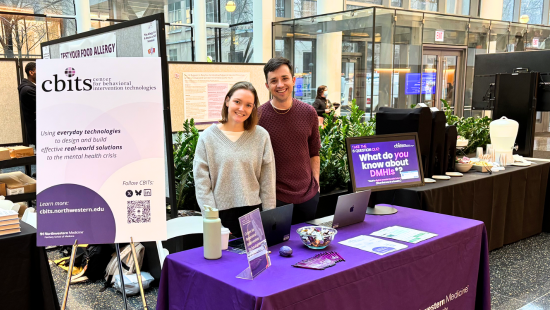CBITs Launches New Pathway to Partnerships, Expanding Its Impact in Digital Mental Health

By Graham Miller - October 6, 2025
The Center for Behavioral Intervention Technologies (CBITs) is launching a new pathway to partnerships, opening its doors to new collaborators looking to explore the possibilities of digital mental health. This initiative marks a pivotal moment of growth for CBITs, as the center leverages not only the expertise of its individual faculty members, but the united power of its faculty, staff and trainees in designing, developing, testing, and scaling digital mental health interventions. By making it easier than ever to harness the center’s joint expertise, CBITs Co-Director Andrea Graham, PhD hopes to deliver innovation to new audiences with new applications.
“CBITs members have unique, exceptional skillsets in cutting-edge methodologies that are transforming digital mental health treatments and accelerating their impact,” says Graham. “We are eager to expand our impact through new partnerships that enable organizations to leverage rigorous and rapid scientific methods to meet their goals.”
The center has identified gaps in the quickly expanding digital health field where their team’s skills could mean the difference between wasted funds and resources, and an effective, scalable, marketable intervention. While there is a growing market for digital health interventions and technology-enabled services, many new interventions do not have the clinical research results to support their effectiveness. CBITs brings expert trial management to their work in combination with a commitment to human-centered design that engages target users throughout the process, increasing the likelihood of a new intervention’s success. CBITs faculty have clinical expertise across a range of common mental and behavioral health areas, including depression and anxiety, suicide and self-injury prevention, eating disorders and weight management, substance abuse, and more, as well as addressing these health issues in individuals across the lifespan. CBITs boasts leading expertise in implementation science to support partners with an existing app to be able to integrate that app successfully into the lives of clients, patients and communities.
CBITs Director of Research Operations Charles Krause, MPH, who will manage the partner-facing communication of the new initiative, explains who specifically might benefit from a CBITs partnership. “The primary partners we envision fall into three general categories: technology and health care industry companies, community organizations, and academics. Each will have different needs and interests, and CBITs is well positioned to support them all.”
Krause is also excited to see where any new opportunity for connection could take the center. “We’re open and excited to explore partnerships with anyone! We would love to hear from those interested in our work and figure out if there’s a way to work together.”
For over a decade, CBITs has built a reputation for rigorous research and thoughtful design in digital health. While its work has traditionally been funded predominantly by NIH grants, the center is expanding its partnership focus to allow for growth opportunities that do not hinge on the stability of NIH-funding. This effort builds on a proud history of cultivating meaningful relationships with foundations and industry partners, where past partnerships have led to real-world impact.
CBITs’ partnership with Mental Health America (MHA) is a prime example. MHA is a non-profit organization with the largest, on-going mental health early identification program nation-wide, with over 20 million individuals having used MHA screening tools since 2014. MHA reaches individuals across the world who seek mental health information and support. Ongoing partnerships with CBITs have helped MHA create and implement new digital tools for screening and intervention across multiple domains.
Already the collaboration between MHA and CBITs has yielded three important tools. CBITs faculty member Rachel Kornfield, PhD led the development of Small Steps SMS, an automated text messaging intervention to help individuals struggling with depression and anxiety that has since been tested and adapted alongside MHA to meet the needs of commonly marginalized communities. CBITs faculty member Jonah Meyerhoff, PhD led the development of Plan-Safe, a free, four-week intervention co-designed with young adults to reduce risk of suicidal behavior and support the management of suicidal thoughts. CBITs faculty member Kaylee Kruzan, PhD led the development of Coping Compass, a low-intensity intervention to help young adults with a history of non-suicidal self-injury manage self-harm thoughts and behaviors, in the moments they are needed most. These interventions are being made available to MHA website visitors to increase access to mental health services.
CBITs also has a successful history of partnerships in the industry sector. Its newest partner is Inspiration at Work, a Chicago-based consulting firm focused on helping organizations and their employees stay competitive in their field. As unemployment rises, CBITs faculty members Stewart Shankman, PhD and Graham have worked closely with Inspiration at Work to develop and clinically test a new smartphone application, DRIVEN, for job-seeking individuals with depression. CBITs is currently working to leverage LLMs to support DRIVEN’s scalability, allowing this tool to be increasingly accessible.
The launch of the new pathway to partnership is designed to be accessible and flexible. On the CBITs partnership page of the CBITs website, a link to a simple form can be found, where partners can explain their general needs and interests. Upon review, Krause holds meetings with prospective partners to assess in greater detail the scope of the intended project and its current stage of development. If there are aligned interests, CBITs leadership then works together to identify which CBITs member is best suited to lead the project and the staff members best equipped to ensure the project reaches its goals.
“The most important thing partnerships do,” says Krause, “is bring new perspectives into the decision-making process. Instead of showing up and telling people what they should want, we invite partners to form relationships with us. Those relationships lead to new research questions, interventions that fit the needs of those we’re trying to help, and stronger implementations of the things we develop.”
To learn more or explore a partnership, visit the CBITs partnership page.